Metabolics Taurine 60 Capsules
Metabolics Taurine 60 Capsules
Couldn't load pickup availability
Description
Description
Taurine is an amino acid that the body synthesises from sulphur-containing amino acids. Cysteine is a particularly significant ingredient of taurine synthesis. The process of synthesis has some rate limiting factors.
Taurine takes part in the formation of bile salts and can help with the body’s reaction to unexpected substances, or abnormal levels of other substances.
It also has poorly understood roles in a number of other functions, such as neural activity, controlling calcium levels and the maintenance of membranes.
Taurine is readily bioavailable. In the diet, taurine is found almost wholly in protein rich sources such as meat and fish. It is effectively absent from vegetable sources. Oral taurine is thought to be functionally available after about 90 minutes, and to remain so for about three hours.
While taurine is found in the brain, research suggest that it is regulated such that oral intake of taurine does not affect brain taurine levels.
Each capsule contains 480mg of taurine. There are no formal upper limits for daily taurine consumption, but this is because of a lack of qualitative toxicology research. It is recommended not to exceed two capsules per day. The kidneys should remove excess taurine, within reason, but high taurine intakes are thought to have detrimental effects. For example, it is thought that high taurine intakes may have an influence on the triggering and maintenance of psoriasis. Very high intakes may have behavioural effects.
Ingredients
Ingredients
How To Use
How To Use
Frequently Asked Questions
When will my order ship?
When will my order ship?
All orders placed before 3pm will be dispatched on the same day!
Do you ship internationally?
Do you ship internationally?
Yes! We ship worldwide using our Royal Mail International Tracked & Signed service.
How can I track my delivery?
How can I track my delivery?
Once your order ships, you will receive an email containing your tracking number. Royal Mail will send an SMS or email notification to recipients regarding the delivery time.
Can I make changes to my order before it ships?
Can I make changes to my order before it ships?
We aim to process orders as quickly as possible but we will try to accommodate any order change. The quickest way to get a hold of us is by emailing us at orders@botanicahealth.co.uk.
Please be sure to include your order number and to let us know what changes need to be made.








